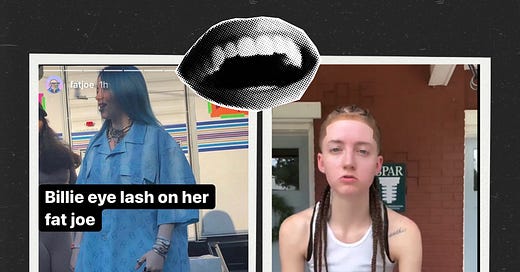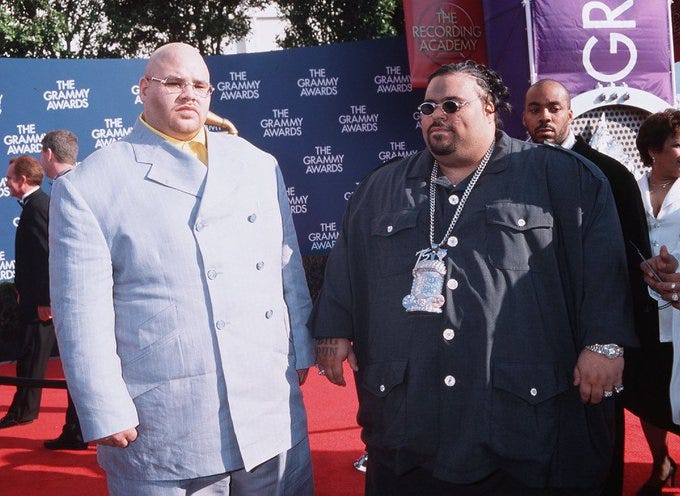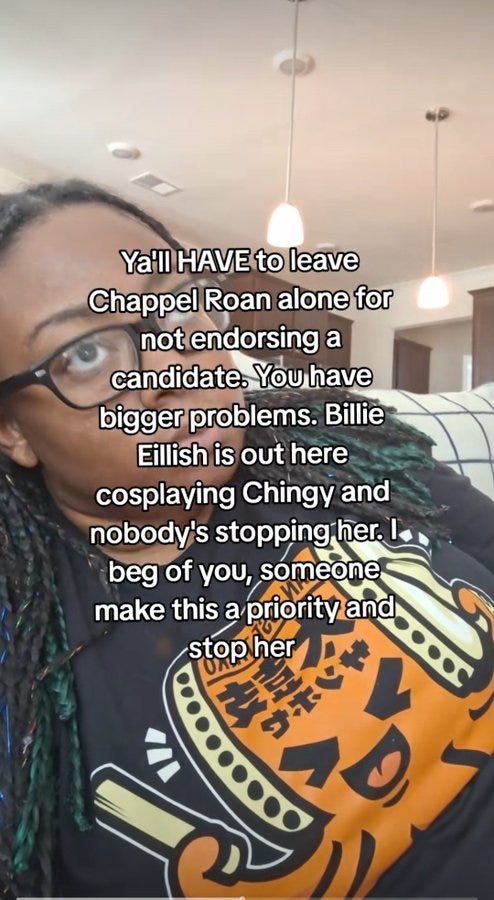The Take Over, The Breaks Over
Digital colonialism and American cultural lack + Book club announcement
“From beneath you, it devours.” - Buffy the Vampire Slayer
Every few months, someone on the internet asks about naming their baby Cohen. A decade ago, Jewish “name nerds” cautioned against using the name, explaining its deep spiritual significance (akin to naming your baby Vicar or Bishop, but with a much more complicated religious and historical legacy). Baby name experts continued to advise parents to avoid using the name as recently as 2023, but parents were undeterred: the name Cohen is currently #239 on the Baby Name Registry. Thousands of parents ignored the (many) warnings and gave their babies a name that is considered offensive to many.
Diving into the forums arguing about the name, a few common themes emerge: many simply don’t care (“if people choose to be offended by it, that’s on them! It might be unpopular in some circles and absolutely fine in others”), or cite their ignorance as a shield (“My husband and I have had the name Cohen picked out for years and plan to name one of our babies Cohen. Never once have I heard of it being offensive until this thread”). For me, it’s interesting to see the complete disregard for the possibility of someone else’s lived experience from the parents who choose to ignore the warnings because it has nothing to do with them, choosing to barrel ahead blindly.
Similarly, it has become impossible to have a conversation about Billie Eilish without having some variation of this argument. When she first emerged on the scene in 2016, Eilish was aggressively alt, adorning herself in beat-up oversized tees and Doc Martens alongside silver hair. In 2018, she dressed in oversized streetwear and told the press it was to prevent comments about her body— at 18, she did not want to be sexualized in any way, and wanted to express her using her personal style without welcoming conversations around her figure.
Things took a turn in 2023, when Eilish started dressing in a more… exaggerated streetwear style that raised eyebrows among Black queers. She frequently wore jerseys, sagged her pants, showed off checkered boxers, wore timbs, grills, and gold chains, all while fighting off claims of cultural appropriation. Many pointed out that Eilish was dressed like Fat Joe, Tupac, or Big Pun, with Fat Joe himself pointing out that an Eilish outfit was a spiritual callback to an iconic red carpet look of his.
Her stans disagreed. Even though Eilish had been called out years before for speaking in a blaccent (using AAVE in front of her brother, Finneas, who asked “Billie? What is this accent?), Eilish fans refused to engage with Black and POC fans who wondered why Eilish was purposely dressing like Black lesbians in order to assert her masculinity. Eilish is young: she’s currently 24 years old and has been famous since 2016, which surely colors her view on her self-discovery journey. However, Black queers are talking, and no one is celebrating Eilish for dipping into Chingy’s closet. In fact, some have been calling her out for her sartorial choices since 2020.
Even more bizarre cases of cultural appropriation took root in my mind as I was writing this. I thought of the white women who were fighting over Indian recipes in March, both of them wearing bindis and saris and accusing the other of stealing their “niche”. The drive wasn’t to cook traditional Indian food or to share their love of their integrated cultures— it was to create content around their interracial marriages and monetize their consumption of Indian culture.
This, I think, is key. On the internet, we’ve become inured to cultural appropriation, in a way: at this point, the vast majority of slang used is lifted directly from queer and POC communities. Think of: what’s the tea, tea, serve, slay, gag, clock, (it’s not clocking to you that I’m standing on business), doll, trade, drag (to insult), read (to insult), hooting and hollering, crashing out, deadass, bet, body tea, brackin, brick, bruh, nah, asf, fr, fym, period, pmo, sis, yns, chile, no cap, cap, low key, etc. What’s really annoying is what happens when teenagers online decide they’re over the words they appropriated and move on, and insult people when they still use them because they grew up using them— to a certain subset of white Americans online, the language, clothing, and culture of other communities is something that can be adopted and dropped at will. It is consumable, mutable, shiftable, and variable.
This has become something of a running joke in certain communities. On Pride, I saw the requisite tweets about certain queer people adopting Japanese names. Similar to the Cohen debate, answers floated in the realm of “it’s ok if it’s respectful” to “I don’t care”. In October, a trans woman became Twitter’s main character of the day when she revealed her therapist refused to call her Saeko. The jokes were plentiful but the question remained: why do white Americans insist on adopting cultures that don’t belong to them?
On The White Lotus’s third season, Sam Rockwell gave a much lauded monologue about sex, gender, culture, and appropriation. While Mike White found himself in hot water over his depiction of a gender binary vs. a gender spectrum, the sentiment behind the monologue was interesting to me. Despite season 3’s clear narrative obsessions— the Western obsession with spirituality as a cure-all, the pain of living with unresolved trauma, the destructive urge to fix bad men— one of them got lost in the kerfuffle of the supersized finale.
"Why do I feel this need to fuck all these women? What is desire? The form of this cute Asian girl, why does it have such a grip on me? Because she's the opposite of me? Is she gonna complete me in some way? I realized I could fuck a million women, I'd still never be satisfied — maybe what I really want is to be one of these Asian girls."
Outside of the problematic gender binary, there was something interesting there: Rockwell’s character not only wanted to possess women and consume them, he wanted to become them. Their external, corporeal forms became another thing for him to have, own, and wear. To me, it was just another manifestation of colonialism, where after dominating and controlling everything else, he needed the one thing he didn’t already have: their identities.
The dichotomy between East and West didn’t need to be laid out so starkly on the show, yet it was. On The White Lotus, the ancient specter of colonialism simply shifted to a new frontier, devouring everything in its path.
Perhaps I’m being dramatic. POC and queer people on the internet have been decrying minstrelsy, digital blackface, and the internet’s use of AAVE (it’s just internet language, they tried telling us in 2024) for decades at this point. Our clothes, hairstyles, modes of speaking, language: they’ve all been offered up and consumed by people online seeking to reify their coolness and adopt new identities. Young gay men move to Bushwick every day and begin referring to themselves as dolls, celebrities regularly embark on problematic appropriation eras as part of their artistic evolution, and we’re forced into submission by armies of people saying we’re insane, obsessed, and delusional. It’s crazy-making. When I sit and think about it, it’s obvious there’s a cultural lack they’re attempting to fill, but there’s no empathy there. It’s odd.
The most American thing in the world is to consume. When we begin new hobbies, our instinct is to buy all new supplies. We don costumes that display our new identities to the world: I am a runner. I do yoga. I’m a reader. The marriage between consumption and display is well documented and alive, but part of me wonders where the shame is. I know who my people are. I know where my family comes from, I know where my roots are. I could never imagine seeing artifacts from a culture that didn’t belong to me and saying: This belongs to me now.
The Evolution of the Culture Vulture: When I posted I was writing this, someone directed me to this incredible YouTube video by Lani’s Lens, where she talked about minstrelsy, blackface, and celebrities with blaccents, tying it to Sinners. A must watch! (YouTube)
What’s it Like to Date After 60?: Candace Bushnell just has it. A brilliant dissection of wealthy older men dating in the Hamptons with so many incredible nuggets. Her writing is sharp and irresistible, taking us into this world of the entitled and odious. She is that girl for a reason!! (The Cut)
Bravo, Just Fire Jax Taylor: I wrote about The Valley a few months ago, and Jax Taylor has only gotten worse. He is the devil. (The Cut)
A Divorce Story: I love divorce. Famously! This is a piece from 2021 where Honor Jones (author of Sleep, on my list!) discusses her divorce and the dissolution of her life (the sub-title is How I Demolished My Life.) (The Atlantic)
Speaking of, The Atlantic launched Games! I’ve been playing Bracket City and losing every single day. They invited me to the launch party after I linked to a few of their articles over the last few months— it was an honor to meet so many of the journalists I’ve been reading for years now.
Men, Where Have You Gone? Please Come Back: A spiritual companion piece to Candace Bushnell’s, this Modern Love essay explores the walls men have around intimacy and highlights their retreat from love and life. People are dragging her online because she worked for Playboy, but that doesn’t make her wrong? Dating sucks now for everyone. (The New York Times)
American Women are Giving Up on Marriage: “Dating is the one thing you can put 10,000 hours into and end up right where you started.” I promise I do not mean to be a pessimist, but this is all stuff I’ve been thinking and writing about since 2016, and it’s never been bleaker or darker. (WSJ, Free link!)
I posted about the American retreat from dating, men’s emotional walls, Love Island, and the dating apps. I never say this but I am really happy with the way it turned out! I also tied it to Materialists, the dating market, and the WSJ article linked above. (YouTube)
Book heads: a number of Substackers put together a catalogue of their 2025 releases! If you’re looking for something to read, this has links, blurbs, bios, and releases running from Jan to Dec. And you can follow the authors on Substack too: best of both worlds.
I’m sunsetting the live book club: my therapist said I need to focus on the things that I do well versus trying to do 100 things poorly. I don’t know why I signed up to be a part-time event planner, but reaching out to venues via Instagram just wasn’t what I envisioned when I set out to hang out, have a glass of wine, and argue about a book. I loved seeing all of you who came out over the last 18 months: it was truly incredible meeting you and talking about all the books we read! I wanted to build community and for a time, I did.
If you signed up recently for the IRL book club please DM me and I’ll refund you your sub price.
The online meeting for Monsters will be 7/13 at 11:30 ET. I’ll send out the RSVP link at the end of the week. If there’s interest, perhaps I’ll bring back the online version in Q4 once I’ve been unshackled from this manuscript.
I’ve been saying no to literally every single thing in service of finishing this draft of my novel, and it feels both stultifying and freeing? It’s intense telling people you can’t do things because you’re locked away, but it’s also motivating because… I want to do things again. Soon!












I think about this a lot, especially as a lot of (white) women are wearing scarves that are essentially a dupatta with their wedding or other formal dresses. I see a lot of south Asian women saying that it's appropriation and am inclined to believe them. But i also wonder when it is okay to have influences from other cultures in fashion and where the line is for appropriation. I can see where Billie goes off the rails -- grills, chains, blaccent... -- but scarves becoming popular fashion, for example, is blurrier to me.
Love your take on White Lotus.
I think there’s some nuance missing Black peoples using Japanese names though in that cultural exchange (not appropriation) is the term for when marginalized people borrow from other marginalized groups. Ideally it would be two way. And it has been in Japan. Japanese rapping can be great.
Am uneven power dynamic is what makes something appropriation.